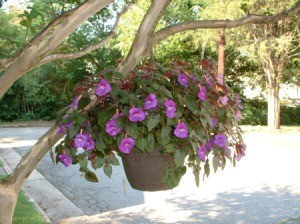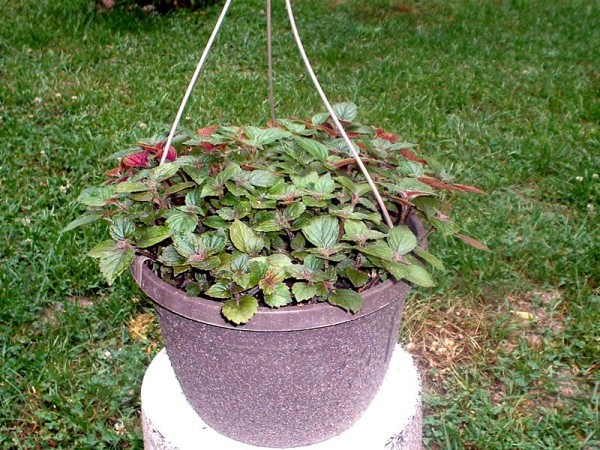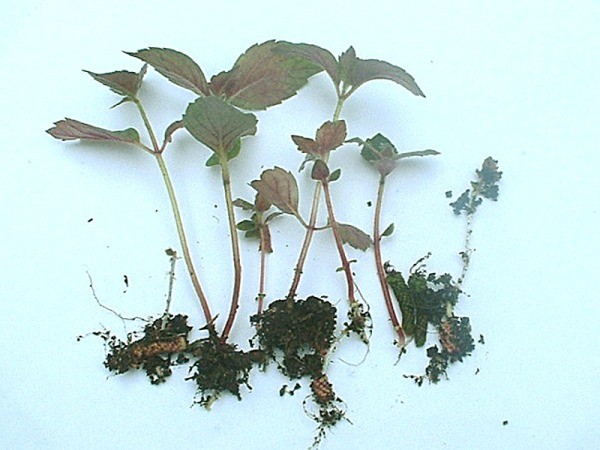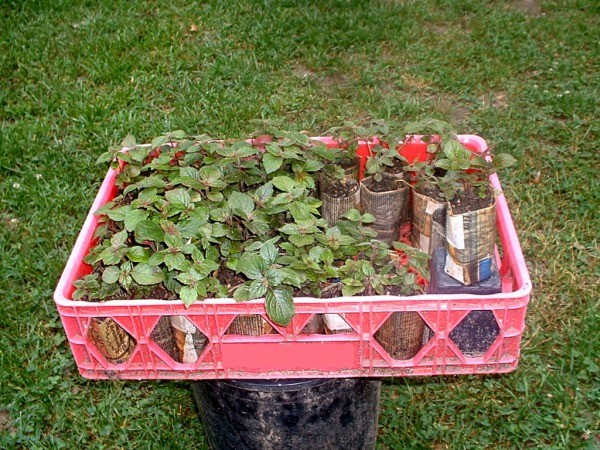 The Achimenes has many common names. A few are Magic Flower, Nut Orchid, Widow's Tears, Hot Water Plant and Cupid's Bow. I prefer the botanical name and pronounce it 'uh-KIM-in-nee', with the accent on the second syllable. The word 'Achimenes' is either singular or plural and the ending 's' is not usually pronounced.
The Achimenes has many common names. A few are Magic Flower, Nut Orchid, Widow's Tears, Hot Water Plant and Cupid's Bow. I prefer the botanical name and pronounce it 'uh-KIM-in-nee', with the accent on the second syllable. The word 'Achimenes' is either singular or plural and the ending 's' is not usually pronounced.
The plant is a member of the Gesnariad family, which among others, includes the Gloxinia and Saintpaulia (the African Violet). It is tropical and its native habitat covers Mexico, Jamaica, Central America, and parts of Brazil and Argentina. Apparently, it has gained widespread popularity with the British. It seems that many suppliers of the plant are based in the UK.
The flowers come in several colors with lilacs, orchids, and lavenders being the most common. It also appears as pink, white, blue, orange, and yellow. Some are two and three toned and there are at least two white Achimenes with blue/purple veining.
Achimenes can be planted in the open flower bed, but due to their unique characteristics, they are best grown as a potted plant. Sporting a drooping habit, they are a perfect flower for hanging baskets.

A rather unusual characteristic of the flower is its tubular structure which has a sharp, downward bend near where it is joined to the supporting stem. I've heard several children comment that the flower was broken. Indeed, it does have that appearance.
The Achimenes is one of the easiest flowers to grow. A well drained, light, loose soil rich in organic matter is best. Feeding once or twice during it's growing cycle with a half strength solution of fertilizer such as MiracleGro is beneficial.
The plant does not tolerate strong sunlight very well. It will do best when grown in part shade. While it can be forgiving of a bit too much sun, it should never be placed where it will receive unfiltered midday sun.
Watering requirements are simple. Keep the soil moderately moist at all times during the plant's active growing cycle, neither dry nor wet.
Depending on which zone the flower is grown in, it can stay in a state of constant bloom for three, four, or more months each year. No pruning is required. Deadheading is beneficial, but a healthy plant will be covered with blooms most all of it's bloom period, deadheaded or not.
I know of no other flower that can be propagated in as many ways as the Achimenes. Division by simply cutting away a clump of plants from the parent plant is probably the easiest. A single stem is easily rooted in either water or soil. One healthy leaf with all of its stem attached is easily rooted this way. As a matter of fact, one healthy leaf with its top half cut away, will root just as easily. Plants can also be increased by collecting the rhizomes produced by the plants and planting them just beneath the soil. The rhizomes resemble tiny pinkish-red pine cones. They will turn green if exposed to sun light.
Another characteristic of the Achimenes which appeals to a lot of people is how easily the plant can be kept from one year to the next. Near the end of its bloom cycle, the plant should be watered less and eventually allowed to dry completely. Before frost, the container should be brought indoors and all the dried, above soil parts of the plant should be carefully removed, being sure not to disturb the roots and rhizomes beneath the soil. The container is then placed in a dark, cool place such as a pantry. It is kept there, unattended all winter.
Around mid March, a little earlier or later, begin looking for signs of new growth from the plant. When these are observed, bring the plant into a lighted area of the home. Water the plant slightly. As new growth continues to develop, the plant can be watered normally. When all danger of frost is over and nights are fairly warm, the container can be taken outside where it will spend the rest of spring, summer and early fall in a state of constant bloom.
You may find that the plant has multiplied several times over and is crowded in its container. Now is a good time to share your Achimenes with others.

Making sure the soil is moderately moist, simply reach into the plant and grasp a few plants near where they meet the soil and pull them out. You will probably find that some of the plants broke away without any roots. Don't worry, they will form roots. Others will have some roots attached and some will even have rhizomes attached. All can be given away and will soon produce a new container of flowers for an appreciative friend.

Growing Achimenes, keeping them year after year, and propagating them, is very easy. It is probably the most carefree flower you can own. I have grown them for years without any sign of pests or diseases. They can be susceptible to spider mites. If mites are suspected or observed, treat with a miticide according to label instructions.
One thing that is not so easy, is acquiring new plants. There are many websites offering Achimenes rhizomes for sale. You will find a lot without pictures. You will find that the ones you want most are often out of stock. You will find that most suppliers are based in the UK and charge a hefty fee for shipment to the States.
The breeders, growers and suppliers of Achimenes deserve to be well compensated for their efforts. However, in light of the fact that the Achimenes multiplies at such a rapid rate, I find the prices for both rhizomes and shipping, for the most part, to be absolutely ridiculous. In protest, I am preparing several flats of Achimenes. These flats will contain many little paper 'pots' with enough plants in each to fill and grow a hanging basket. I will put up a sign and give these plants away to anyone passing by.

You may want to share the cost of new rhizomes with a friend and in keeping with the ThriftyFun spirit, when you have more Achimenes than you will ever need (which will be sooner than you think), share your bounty with friends.
'A' is for uh-KIM-in-nee, y'all! Happy growing and sharing.
(And do pardon the poor photography. Hopefully, I will have a new camera soon)
Doug
Three years back, I was sick for a while. I left my Achimenes out too long and the cold killed them. I got another start from a friend to whom I had given a start. In those three years, that small start multiplied into what you see here. This is the purple Achimenes pictured. I would estimate there are about one to two thousand rhizomes within these plants.
(I forgot to mention another method of propagation in my post. These small rhizomes are segmented. Unless handled carefully, they will break into 20-30 pieces. Each individual segment is capable of making a new plant. So, you could easily get 50-60 thousand or more plants from the plants pictured here).
Maybe now, you can understand my ire. One (1) typical Achimenes rhizome from eBay will cost from $5.50 to $10.00, and shipping for this, less that 1/10 of an ounce rhizome, will be at least $5.50. You could easily pay $15.50 for one rhizome. Unless the plant has been bred in recent years, I think three bucks would be fair for the rhizome and shipping within the states.
In further protest, I will send to any ThriftyFun member, free rhizomes as long as they last. All I would ask is a self addressed stamped envelope. This is a rhizome and not a live plant. I'm making this offer assuming I wont need any special permit to mail rhizomes as I would for live plants.
You can message me if you're interested.

If you're still growing Achimenes plants, I'd love to trade some varieties with you! I have about 25 different ones and live in Western KY. They're starting to come into full bloom now!

I have sent you a private message so we can discuss this.
I get an error when I try to message you. I will keep trying.